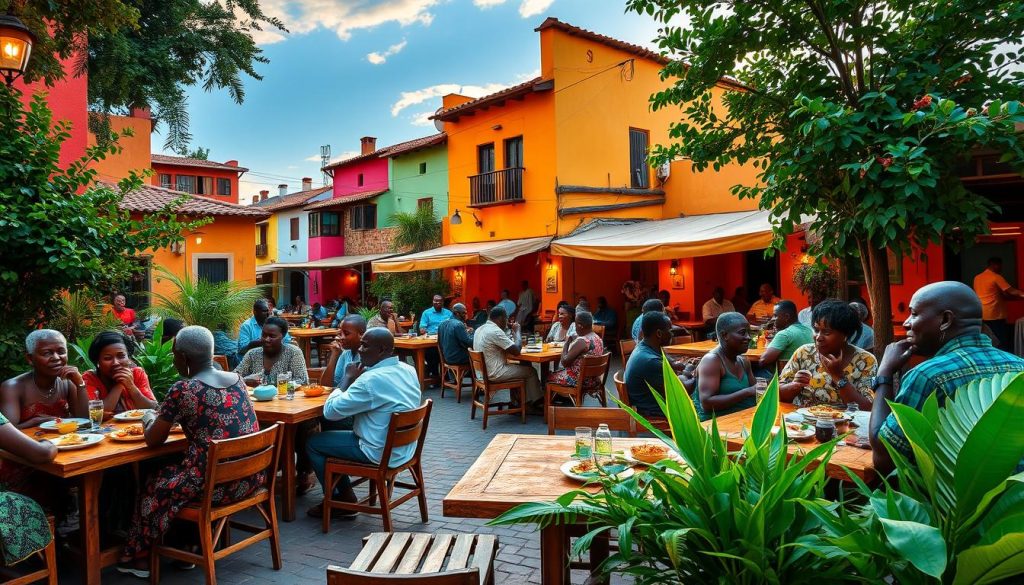The African culinary scene is booming, offering many chances for new business owners. With more people in the middle class and a growing need for different food experiences, it’s a great time to start a restaurant. This guide will give you the tools and advice you need to succeed in this exciting market.
Understanding the Restaurant Landscape in Africa

The African restaurant market is full of life and variety. It’s shaped by culture and economy. Different regions have their own dining styles, using local ingredients and cooking methods.
More people are eating out in cities, thanks to urban growth. This has led to a rise in restaurants. Both big chains and local spots are opening to meet the changing tastes of city folks.
Younger people are driving changes in what we eat. They want to try new things and are more aware of the world. Restaurants must now offer a mix of local and global dishes. They also need to focus on healthy and sustainable food.
Reports from Statista and the World Bank show the market is growing. This is good news for new businesses. It also highlights the importance of knowing what each region likes.
Market Research: Knowing Your Audience

Knowing who your customers are is key to a successful restaurant. By doing thorough market research in Africa, you can find out who they are, what they like, and how they behave. This knowledge helps you make smart choices about your menu and how you serve food.
- Surveys give you direct feedback on what customers want and expect.
- Focus groups let you dive deep into why people choose certain places to eat.
- Looking at your competitors shows you what’s missing in the market.
Knowing what your customers value in a meal affects many things. This includes the food you serve and the atmosphere of your restaurant. Using data from Nielsen and Euromonitor can give you insights into African food trends. This makes their information a valuable part of your strategy.
Tips for Opening a Restaurant in Africa
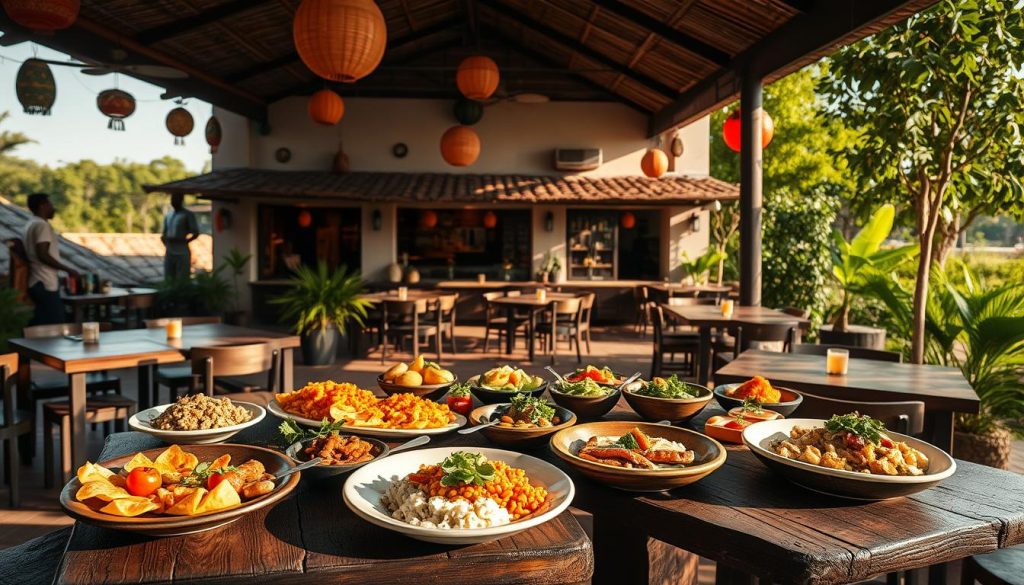
Starting a restaurant needs a smart plan. You must find a unique selling proposition (USP) and know the local dining trends. These steps help make your restaurant stand out and keep customers coming back.
Identifying Your Unique Selling Proposition
To be different in a crowded market, you need a clear USP. Think about these points when making yours:
- Unique menu items that show off local tastes and ingredients.
- Top-notch service that leaves a lasting impression.
- New dining ideas that appeal to your audience.
A strong USP grabs people’s attention. It shows what makes your restaurant special in Africa’s lively food scene.
Researching Local Dining Trends
Staying up-to-date with local food trends is key. Trends might include:
- More people eating plant-based.
- Street food and ethnic dishes gaining popularity.
- A focus on green and local ingredients.
Surveys, checking out successful places, and reading food news help a lot. Watching social media can also show what customers want. This lets you tweak your restaurant idea to fit their needs.
Choosing the Right Location for Your Restaurant

Finding the perfect spot for your restaurant is key to success. Think about how easy it is to get to and how visible it is. A place that’s easy to find and get to can really help your business grow.
Accessibility and Visibility Considerations
When picking a spot, think about how easy it is to get to. Look at things like:
- How close it is to public transport
- If there’s parking nearby
- How many people walk by
- If there are other places nearby that attract people
Also, how visible the spot is matters a lot. A place that stands out can attract more customers. A good sign and a nice look can help people notice your restaurant.
Evaluating Local Competition
It’s important to know what other restaurants are like in the area. Look at what they offer and how much they charge. See what makes them popular and:
- Who their customers are
- What dishes they serve
- How they market themselves
Knowing what works for others can help you make better choices for your restaurant.
Defining Your Restaurant Concept and Cuisine
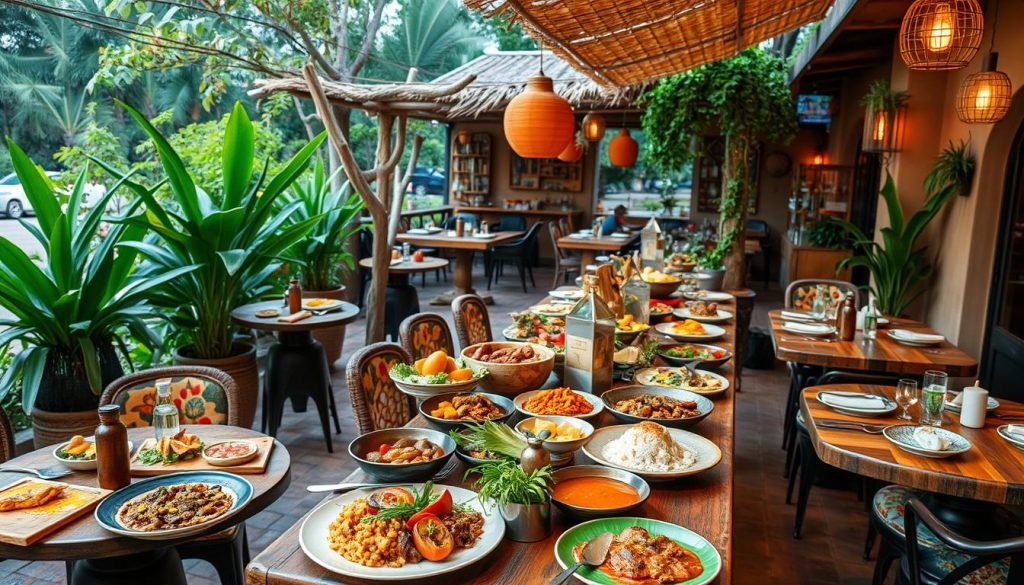
Creating a strong restaurant concept is key to standing out in the culinary world. It begins with choosing your cuisine, which is the heart of your identity. Whether you dream of a fancy dining place or a laid-back spot, your cuisine should show your passion and match what your customers want.
Great restaurant ideas often use local ingredients and flavours. This attracts people who want real, authentic food and helps build a community feel. Think about these points when shaping your restaurant concept:
- Know what your customers like and how they eat.
- Use fresh, seasonal ingredients to keep things tasty and green.
- Make your place welcoming, fitting the food you serve.
- Look at what’s working in your area for ideas.
A clear restaurant concept and the right cuisine can make a big difference. It shapes how customers feel and what they think of your place. By matching these with what you’ve learned about your market, you create a unique and appealing identity.
Licensing and Legal Requirements

Starting a restaurant means dealing with legal stuff and getting the right licenses. It’s a bit tricky because rules vary across Africa. You need to follow health laws and get all the needed permits to run a successful restaurant.
Understanding Health and Safety Regulations
Health and safety rules are key for a restaurant. They make sure food is safe for customers. Things like how food is stored, kitchen cleanliness, and staff hygiene must meet local standards.
Knowing these rules helps you follow them and keeps your restaurant’s good name.
Getting the Necessary Permits
You need to get several permits before opening. These include food and drink licenses, health permits, and fire safety certificates. Each one checks if your place meets the required standards.
Talking to local councils or legal experts can help. They can tell you what permits you need and make getting them easier.
Building a Strong Business Plan

A detailed restaurant business plan is key for any new restaurant owner. It acts as a guide and is vital for getting funding from investors or banks. It focuses on financial planning and clear goals, which are the foundation of success.
Financial Projections and Budgeting
Creating a restaurant business plan requires careful financial forecasting. Begin by guessing sales and understanding your market’s spending habits. List the costs to start your restaurant, like buying equipment and initial stock. A solid budget helps track expenses, ensuring money is used wisely.
This planning helps avoid unexpected costs that could harm your business.
Setting Operational Goals
Setting clear goals is crucial for success. It helps measure how well you’re doing and keeps everyone focused on growth. Goals like customer service standards and monthly sales targets give a clear path to success.
Regularly checking these goals keeps everyone on track with the restaurant’s vision. It also allows for changes as the market changes.
Designing Your Restaurant Layout
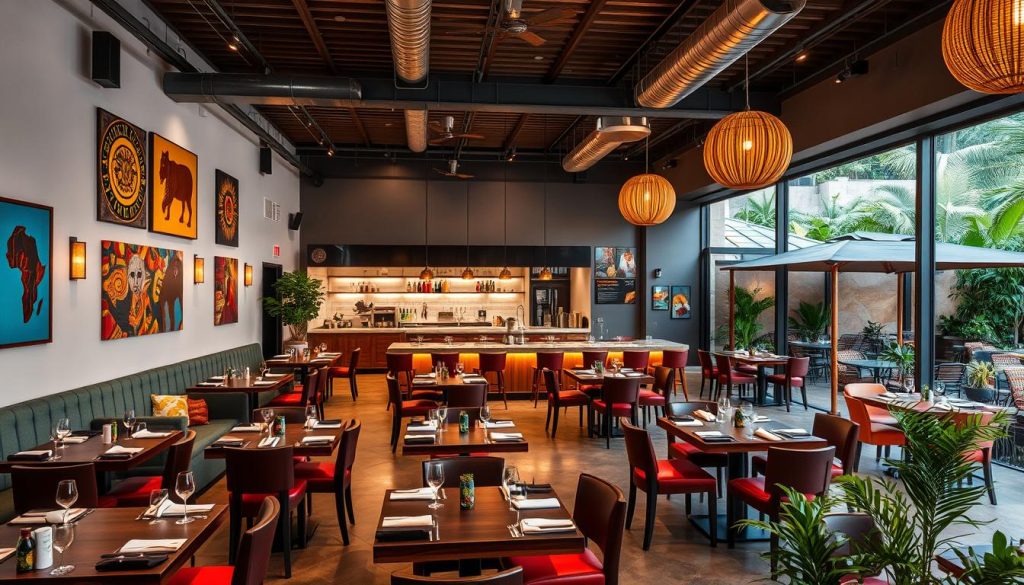
The layout of a restaurant is key to a great customer experience and efficient staff. A well-designed interior can improve how customers move around and enjoy their visit.
When planning your restaurant layout, consider these important points:
- Seating Arrangements: Tables and chairs should be arranged for easy movement. They should also create a cozy feel for diners.
- Kitchen Design: A well-organised kitchen is crucial for fast service and smooth staff work.
- Bar Placement: The bar should be in a spot that draws in guests. It should also offer quick service to add to the lively vibe.
The design should match the restaurant’s theme and brand. Using design elements that reflect the theme can engage customers and make their dining experience memorable. Looking at successful designs from other restaurants can offer great ideas for new owners.
Hiring the Right Staff
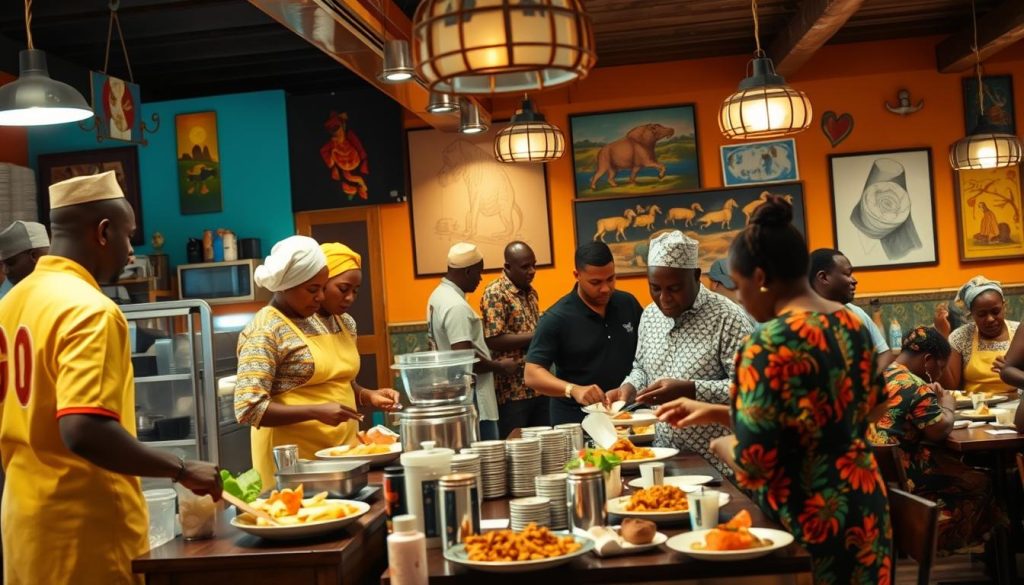
Getting the right staff is key for any restaurant’s success. Skilled and motivated employees make a big difference in the dining experience. They also boost customer satisfaction. To find the best candidates, strong recruitment strategies are crucial.
Training and Development Strategies
Training staff well is more than just the first day. It’s about teaching the restaurant’s culture and service standards. This helps new staff fit in and feel part of the team.
Using personality tests and structured interviews can also help. These methods find candidates who match the restaurant’s values and service goals. Training from hospitality experts provides great advice on creating effective programmes.
Keeping staff trained and developed keeps them happy and motivated. Regular workshops and upskilling help improve service quality. Recognising and promoting staff from within builds loyalty and a positive work atmosphere.
Marketing Strategies for Your Restaurant Launch

Creating excitement for your restaurant launch is key to attracting customers. It’s also important for building a loyal clientele. Effective marketing strategies can greatly impact your success. A good launch plan is essential for your promotional efforts.
Here are some tactics to create buzz around your opening:
- Host a Pre-Launch Event: Organise an exclusive tasting for local influencers, food bloggers, and community leaders. This event can spark word-of-mouth marketing, building interest before you open.
- Collaborate with Local Businesses: Team up with nearby shops and businesses. Joint promotions can boost visibility for both and draw in more people.
- Utilise Social Media: Use platforms like Instagram and Facebook to share sneak peeks of your menu, décor, and concept. Engaging content can attract potential customers and encourage them to share your posts.
- Offer Special Promotions: Think about special discounts or limited-time offers for your first week. An incentive can increase foot traffic and create a sense of urgency.
Using these marketing strategies in your launch plan can lay the groundwork for success. A solid pre-launch strategy not only builds interest but also establishes a loyal customer base from the start.
Utilising Digital and Social Media Marketing
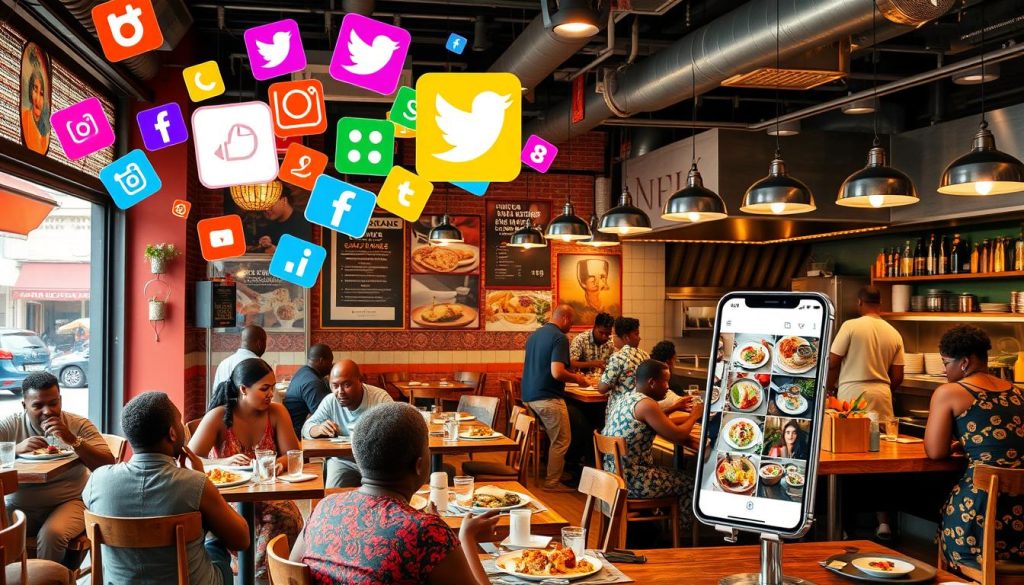
Having a strong online presence is key for any restaurant’s success. Digital marketing helps restaurants reach out to customers, show off their food, and gain loyal fans. A good plan includes a website, social media, and managing online reviews.
Building Your Online Presence
Creating a strong online presence takes a few important steps. First, make a website that’s easy to use and shows off your menu and location. Make sure it’s easy for search engines to find.
Having social media profiles on sites like Instagram and Facebook lets you talk directly to customers. Use these platforms for special promotions or new dishes to get people excited to come.
Engaging with Food Bloggers and Influencers
Working with food bloggers and influencers can really help you grow. They have lots of followers, so you can share your restaurant with more people.
These partnerships can lead to real reviews and photos that show off your restaurant. This can spark interest and get people to book a table.
Implementing Operational Systems and Processes
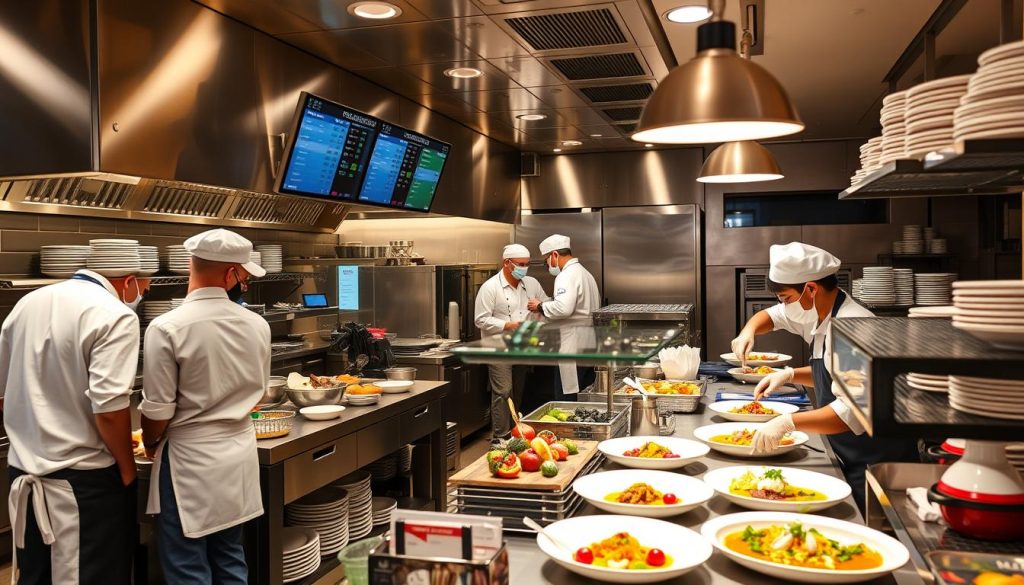
Running a restaurant well is key to making money. Good operational systems help restaurants work better, make customers happy, and save time. This part will look at tech that makes managing easier and boosts performance.
Tech Solutions for Efficient Management
Today, tech is a must in restaurants. Using top-notch management tools like Point of Sale (POS) systems can really improve service. These tools handle bookings, payments, and sales tracking smoothly. They also have features like:
- Automated reporting tools for better financial oversight
- Customer relationship management software to analyse customer preferences
- Online order management systems to streamline food delivery
Inventory and Supply Chain Management
Good supply chain management keeps restaurants stocked right and cuts down on waste. Building strong ties with suppliers can get you better deals and quality products. An inventory system tracks stock, predicts needs, and plans orders. Important points to remember are:
- Regular inventory audits to highlight discrepancies
- Utilisation of forecasting tools to optimise orders
- Leveraging local suppliers for fresher produce
Creating a Memorable Customer Experience
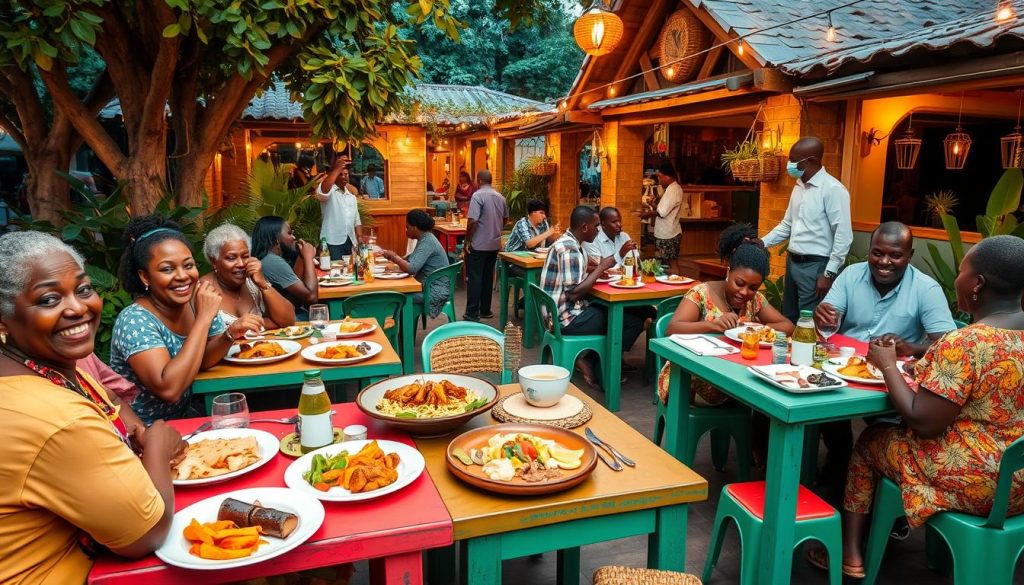
Creating a great customer experience is key for any restaurant wanting to keep customers coming back. Start by training staff to be friendly and attentive. Knowing the menu well and making good recommendations also helps a lot.
The dining atmosphere is also very important. Things like decor, lighting, and music can really change how guests feel. So, making your place cosy and inviting can make customers happier.
Listening to what customers say is important for getting better. Using their feedback to improve shows you value their opinions. Also, try new things like themed events or special dining experiences. These can make your guests’ visits unforgettable.
- Train staff for excellent service.
- Focus on creating a welcoming atmosphere.
- Encourage feedback for improvement.
- Host themed events to boost engagement.
- Offer personalised experiences to create memorable moments.
Sustainability Practices in Your Restaurant
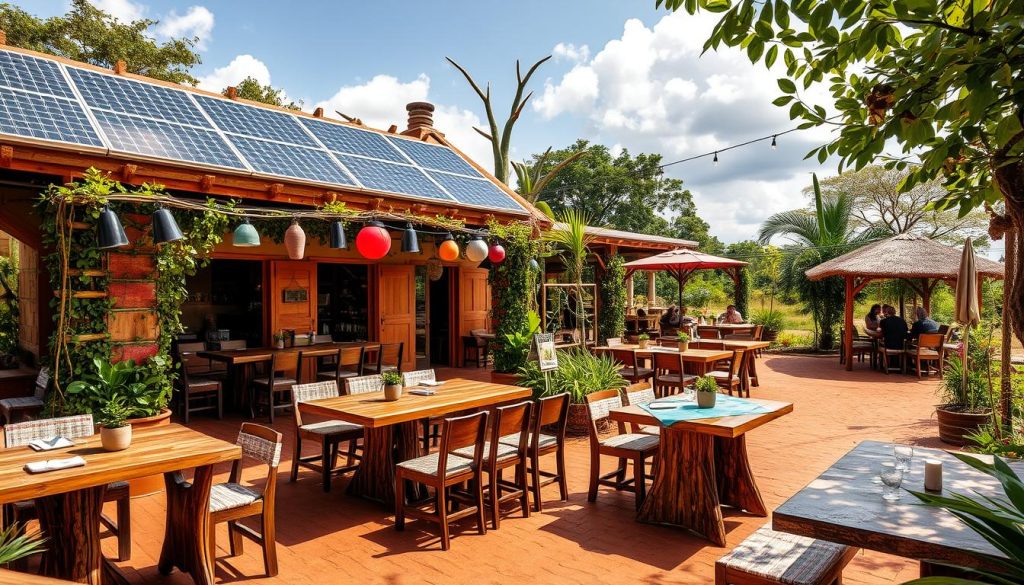
More people want to eat at sustainable restaurants. This shows a big change in what people look for when they dine out. To meet this need, it’s key to use eco-friendly ways.
Reducing waste is very important. It helps restaurants cut down on food waste and use resources better.
Being energy-efficient is also crucial. Using appliances that save energy, LED lights, and better heating and cooling systems helps a lot. It cuts down on carbon emissions.
It’s also vital to source food sustainably. Working with local farmers and suppliers who are eco-friendly improves food quality. It also helps the local economy.
- Implement waste segregation to improve recycling efforts.
- Incorporate plant-based menu options to reduce environmental impact.
- Use biodegradable packaging for takeaway orders.
- Regularly monitor energy consumption to identify areas for improvement.
By showing off these green efforts, you can attract more customers who care about the planet. As more people look for eco-friendly places to eat, those who focus on sustainability will do well.
Reflecting on Your Restaurant Journey
Reflecting on your journey in the restaurant industry is key to success. Every experience, good or bad, teaches you something valuable. It helps you find what works and what doesn’t.
Improvement should always be your top goal. Listening to what customers and staff say helps you improve. It makes your menu and service better, keeping customers happy and loyal.
It’s also important to keep up with trends in the restaurant world. Regular checks help you stay ahead of what customers want and market changes. This way, your restaurant can grow and thrive for years to come.

